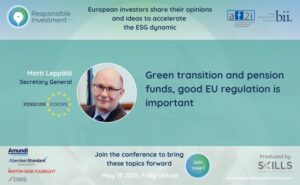
Matti Leppälä, Secretary General
PensionsEurope
Matti is a member of the Occupational Pensions Stakeholder Group of EIOPA and he has been the Chair and Vice-Chair of the OPSG in 2013-2018. He was a member of the European Commission’s High-Level Group of Experts on Pensions 2018 – 2019. Matti has been the Chair of the World Pension Alliance 2018 – 2019. Matti will be speaking at the Responsible Investor Live conference in Paris on 18 May, 2021 (expected to be a virtual conference).
What is the state of play in Europe in this field of Green Transition: Where do we stand? What has been done?
| Climate change and environmental degradation are an existential threat to Europe and the world. Europe needs a new growth strategy that will transform the European Union into a modern, resource-efficient and competitive economy.
For us there are many relevant initiatives for Financial Services such as the European Green Deal Investment Plan, the Just Transition Fund, the Renewed Sustainable Finance Strategy and the Review of the Non-Financial Reporting Directive. The European Green Deal must lead to actions to move to a clean, circular economy, restore biodiversity and cut pollution. In brief, the plan outlines investments needed and financing tools available. It explains how to ensure a just and inclusive transition.
In 2021, the work will continue with e.g. implementation rules in taxonomy regulation, considerations of Brown Taxonomy and Social Taxonomy, EU green bond standard and various actions in the Non-financial reporting standards. This will be a busy and heavy agenda and it is important to have consistency and logic in the actions and give those to whom the new rules and requirements are addressed also enough time to consider and implement them.
Regulation alone will not make the EU more sustainable, but actions by many entities will. PensionsEurope welcomes the relevant initiatives and pension funds are eager to take active part in Europe’s sustainable transition.
A challenge is how to align the policy of sustainability with the other existing challenges and special consideration should be given to avoid harming growth in the post COVID-19 environment.
What role could pension funds play in the green transition?
| PensionsEurope believes that pension funds can play an important role in green transition. By nature, Pension funds are long-term investors that aim to deliver adequate pensions for their members and beneficiaries. This means they naturally take the long- term view and are required to consider the long-term risks that may affect their portfolios. Targeted policy initiatives on sustainability can complement ongoing initiatives within the financial sector.
There is a long tradition of pension funds to align their investment practices with the values of their members and beneficiaries and the society at large. In the past, pension funds were among the first to take responsible investment strategies focused on ethical exclusions. Nowadays, a much broader spectrum of more sophisticated responsible investment decisions is becoming mainstream. This trend is expected to continue as the impact of climate change is becoming more apparent and as a result members and beneficiaries are increasingly demanding through their representatives about their expectations relating to the broader impact of the assets managed on their behalf.
For this reason, we are convinced that a much higher percentage of pension capital will be invested in assets promoting Green Transition and Sustainability in the future. We expected further steps to acquire better data on companies and other investments, clearer definitions on what is considered sustainable and more transparent financial services. This will help to lift some of the barriers pension funds face when wanting to invest more sustainably.
What are the key barriers to sustainable investments for IORPs? How could authorities help reduce these barriers?
| PensionsEurope identifies three main challenges and three main opportunities for mainstreaming sustainability for IORPs over the coming 10 years. The three main challenges appear to be:
- the regulatory framework and the complexity of implementation in the main interconnected regulations (TR, SFDR, IORP II) remains a challenge. Consistency between all consultations becomes then extremely important;
- the availability, collection, processing, and reliability of data, that are required to be reported and accessed from the perspective of financial participants and the hardship to provide such sustainability-data
- the investor’s unawareness and acceptance of the EU’s sustainable framework.
The three main opportunities appear to be:
- Improving the European economy and pension funds by emphasizing on sustainability and long-termism, while continuing with policies that make the EU the principal market for sustainable finance
- Providing right motives to incentivize sustainable investments.
- The standardization of data reporting, and then the digitization of data reporting and access
There is a lack of projects for green investments and lack of proper motives for all economic players, both public and private, to make their transition towards sustainability. We encourage public authorities to lead by example and to initiate more public green projects and assets. Many pension funds would be willing to invest in such initiatives.
The Commission is expected to define its new strategy on sustainable finance in the forthcoming weeks.
What can we expect from the new action plan? How will this discussion potentially affect the debate on the review of the IORP II Directive?
| The new EU strategy will be built on the results achieved by the implementation of the Sustainable Finance Action Plan 2018, setting at the same time more ambitious targets, due to the commitment with the Green Deal. The scope of the future strategy will include a specific SMEs’ transition and the support of the local/regional economy. The Commission is expected to publish a roadmap in the coming weeks, followed by a public consultation that will probably be launched end of April.
The EU should refrain from establishing strategies for private investment but should provide incentives to stimulate the desired behaviour. The current EU legislative framework (+ national standards) already provide the necessary tools for investors to influence companies’ environmental strategies.
We believe that there should be an incentivizing rather than a penalising approach: penalising investments in environmentally harmful activities may be detrimental to companies and financial entities that are on a transition path but carry-on activities, which are still brown i.e. harmful today, by preventing them access to investments they need to operate that transition. Investments in sustainable business activities should be incentivised instead of penalizing investments that are not in line with certain sustainability targets.
PensionsEurope believes that more efforts and resources should be dedicated to social challenges, especially to contrast the socio-economic consequences of green transition and the Covid-19 pandemic.
How does the IORP II Directive encourage pension funds to adopt a sustainable approach when deciding on their asset allocation?
| It is explicitly required to take the long-term view when investing assets. Now, IORP II specifically permits IORPs to consider the potential long-term impact of investment decisions on environmental, social, and governance factors. It doesn’t require IORPs to make ESG investments but if they choose to do so they have to disclose it. ESG and especially climate change risks must be considered in the risk management of an IORP. The Directive also requires that the governance system of an IORP has to include consideration of ESG factors related to investments.
The ESG framework for IORPs is in fact the most advanced amongst financial market actors. Member States have only recently transposed these requirements into national law. For this reason, before making any changes, a detailed evaluation should take place and a reasonable implementing period should always be foreseen. Some may want to create more guidance on ESG integration or clarify investor duties (e.g. enhance fiduciary duties) and revise and further enforce rules of IORP II such as mandatory analysis on long-term impact of investments. The autonomy of pension funds in their investments and the primary fiduciary duty to pay pensions are paramount in importance if the basic investment rules are reconsidered.
| investESG.eu is honored to be a partner of Responsible Investment Live 2021




